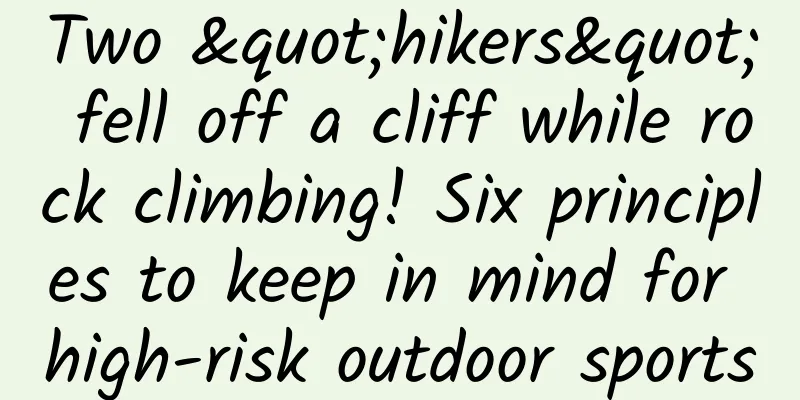Two "hikers" fell off a cliff while rock climbing! Six principles to keep in mind for high-risk outdoor sports

|
Expert interviewed: Su Hao, professor of the School of Sports Human Sciences, Beijing Sport University On October 22, Dalian Dahei Mountain Scenic Area issued a situation report stating that two groups of "hikers" ignored the safety warning signs and staff's dissuasion and insisted on entering Dahei Mountain for rock climbing. Two people accidentally fell from the cliff during the rock climbing process. A woman in her 60s fell and was seriously injured; a man in his 60s fell from the cliff and had no vital signs. Coincidentally, on April 14, 2019, at the East Peak of Fushan Mountain in Qingdao, a middle-aged man lost consciousness on the top of the mountain. Unfortunately, despite the rescuers' full rescue efforts, the man eventually died. At present, outdoor sports are booming, and more and more people are going to nature to participate in them. They are affectionately called "donkey friends". This term mostly refers to outdoor enthusiasts who carry backpacks, tents, sleeping bags, rock climbing, camping, hiking, and cycling. "But there are risks outdoors, so be cautious when entering!" Su Hao, a professor at the School of Sports Human Sciences of Beijing Sports University, said in an interview with the "Global Times Health Client" that outdoor sports, in a narrow sense, specifically refer to sports such as rock climbing, mountaineering, cross-country, and hiking, and many donkey friends like to carry out activities or adventures in unfamiliar places or inaccessible areas, resulting in various situations of getting lost, losing contact, or being killed. Some donkey friends escaped safely through the search and rescue of firefighters, police and rescue teams, but many donkey friends lost their lives and could not come back. Su Hao said that these lessons are painful! In order to prevent similar situations from happening again, the majority of donkey friends must have a sense of safety and cherish life. Plan your route properly and understand road traffic. Plan your route well before traveling and fully understand road traffic. For example, when entering a mountainous area, pay attention to whether there are sudden situations such as falling rocks or mudslides ahead. Be well equipped and bring a first aid kit. Wear appropriate shoes and clothing to improve safety and comfort. For example, shoes should be non-slip, wear-resistant and supportive, and clothing should be breathable and not too tight or too loose. If you plan to be outdoors for a long time, you need to bring some food to fill your stomach. In addition, remember to bring a first aid kit, which may save your life at a critical moment. Be aware of risks and use the "STOP" rule. Many hikers have no sense of risk and rashly enter various dangerous or inaccessible areas without sports experience and safety awareness, increasing the chances of getting lost, losing contact, and dying. In addition to walking along familiar paths, you should also bring a compass in case of emergency. If you get lost, you can use the "STOP" rule: S (Stay): The first step to stay calm. T (Think): Ask yourself some key questions and analyze the current situation, such as which places you just passed. O (Observe): Look around carefully and try to find some landmarks, such as streams, rocks, caves, roads, etc. P (Plan): Comprehensively analyze various factors and plan the next action, such as finding a camping site in advance, choosing a place that is dry, flat, has a wide view, has access up and down, is sheltered from the wind and has drainage, and finding wood for making a fire before dark. Observe the environment and pay attention to weather changes. Weather changes are one of the most likely causes of accidents. Before traveling, be sure to pay close attention to the weather conditions at your destination. For example, in summer, beware of typhoons, lightning, mudslides, etc., and in winter, avoid strong winds, sandstorms, heavy snow, etc.; do not go to canyons, mountains, or wading areas during thunderstorms to prevent sudden floods. At the same time, be alert to heat stroke, mosquito bites, hypothermia, etc. Do what you can and don't take risks. Fully understand your health status and ask yourself carefully before each activity whether you are really prepared for safety. Especially for middle-aged and elderly people, as their sports abilities are declining and their limbs are not as flexible as when they were young, they should not take risks. Middle-aged and elderly people mainly do mild outdoor activities such as walking and hiking, cycling on flat roads, etc. "I am most afraid that some middle-aged and elderly people think they have sports ability and participate in high-risk outdoor activities such as rock climbing." Su Hao said that when you reach a certain age, you should seek stability and health, and don't satisfy your "adventure spirit" too much, especially those with high blood pressure and heart disease, and don't do extreme outdoor sports. Young people should maintain a sense of awe. Some places are not for everyone to challenge. Say "no" to the "wild roads" that you are not sure of! When you encounter danger signals or feel unwell, you should stop the activity immediately and return to a safe area. Don't "go against" nature. You are never its opponent. Avoid injuries and strengthen targeted training. The road conditions in the wild are complicated. Sprained ankles and fractures are common injuries in outdoor activities. It is recommended to warm up before activities and strengthen targeted training at ordinary times to fully prepare the body for exercise. If you sprain your ankle, you should stop the activity immediately and sit up to raise your foot to facilitate venous return and reduce swelling and pain. If conditions permit, you can also apply cold compresses to control the development of injuries. Apply cold compresses for 10 to 20 minutes each time, once every 6 hours, and apply hot compresses after 24 hours. Su Hao finally emphasized that safety is the top priority for outdoor activities. Do not go to unopened tourist mountainous areas or dangerous mountainous areas without permission, and avoid playing in unmanaged mountains. (Global Times Health Client Reporter Li Danni) |
Recommend
WeChat Android version 8.0.14 beta version released, with developer updates
[[424212]] Yesterday, Tencent WeChat team release...
This penguin species lays only two eggs at a time, one of which is doomed to die
In the movie "Happy Feet", there is a p...
A complete analysis of MINISO's private domain
Since its establishment in 2013, MINISO has alway...
Meituan responded to the cancellation of Alipay. Why did Meituan cancel Alipay again?
Meituan responds to cancellation of Alipay July 3...
The "Ground Space Station" is here! Do you know the elements that make up the space station?
On February 27, my country's first "spac...
How should self-media content marketing accept advertising?
Let’s talk about content marketing today. In simp...
9 mysterious maps, how many can you recognize?
Loading long image... Source: National Geographic...
How to do a good job in user operation of Toutiao?
If I am the operator of Toutiao account , how can...
AiKop | "Cats" on the big ship
One, two, three...prepare to sing Let's learn...
After looking at these numbers, it's up to you to decide whether to quit smoking or not.
Your browser does not support the video tag 《Cott...
Five Thanksgiving marketing tactics
The annual Thanksgiving is coming again! Is the p...
Toutiao information flow advertising analysis and delivery skills!
All the newbies who switch to the information flo...
Face-scanning payment is well received but not popular. Why are consumers and merchants unwilling to use advanced technology?
I believe most people are familiar with mobile pa...
Weekly Science and Technology Talk | This "clairvoyance and super hearing" can help us better detect marine disasters
Among various oceanographic instruments, ocean bu...
Gehua Xiaoguo TV Box: One box is equivalent to two boxes in the past, with 140 sets of live TV + iQiyi smart on-demand
The TV cabinet at home is always messy and cannot...









